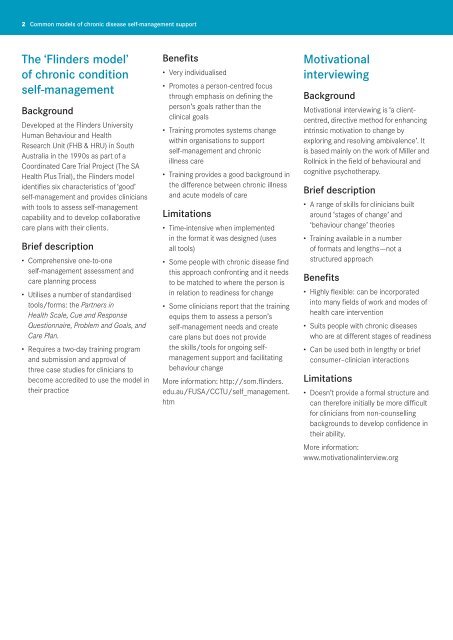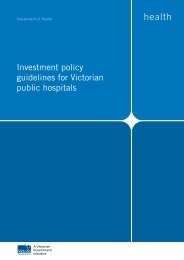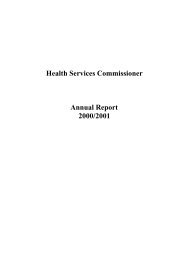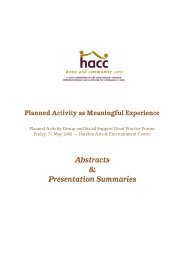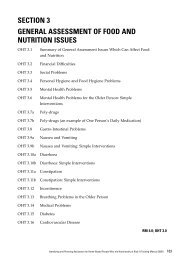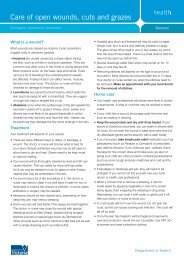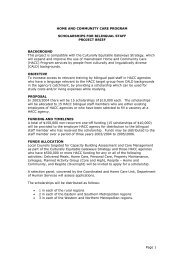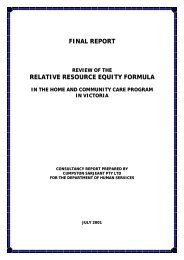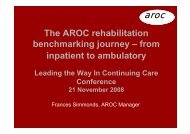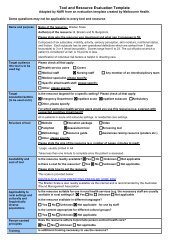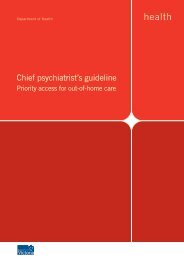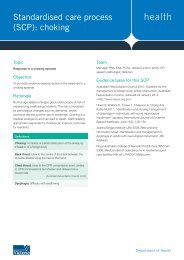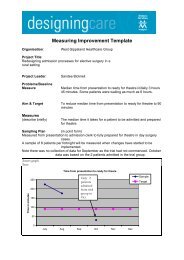Common models of chronic disease self-management support
Common models of chronic disease self-management support
Common models of chronic disease self-management support
Create successful ePaper yourself
Turn your PDF publications into a flip-book with our unique Google optimized e-Paper software.
2 <strong>Common</strong> <strong>models</strong> <strong>of</strong> <strong>chronic</strong> <strong>disease</strong> <strong>self</strong>-<strong>management</strong> <strong>support</strong><br />
The ‘Flinders model’<br />
<strong>of</strong> <strong>chronic</strong> condition<br />
<strong>self</strong>‐<strong>management</strong><br />
Background<br />
Developed at the Flinders University<br />
Human Behaviour and Health<br />
Research Unit (FHB & HRU) in South<br />
Australia in the 1990s as part <strong>of</strong> a<br />
Coordinated Care Trial Project (The SA<br />
Health Plus Trial), the Flinders model<br />
identifies six characteristics <strong>of</strong> ‘good’<br />
<strong>self</strong>‐<strong>management</strong> and provides clinicians<br />
with tools to assess <strong>self</strong>-<strong>management</strong><br />
capability and to develop collaborative<br />
care plans with their clients.<br />
Brief description<br />
• Comprehensive one-to-one<br />
<strong>self</strong>‐<strong>management</strong> assessment and<br />
care planning process<br />
• Utilises a number <strong>of</strong> standardised<br />
tools/forms: the Partners in<br />
Health Scale, Cue and Response<br />
Questionnaire, Problem and Goals, and<br />
Care Plan.<br />
• Requires a two-day training program<br />
and submission and approval <strong>of</strong><br />
three case studies for clinicians to<br />
become accredited to use the model in<br />
their practice<br />
Benefits<br />
• Very individualised<br />
• Promotes a person-centred focus<br />
through emphasis on defining the<br />
person’s goals rather than the<br />
clinical goals<br />
• Training promotes systems change<br />
within organisations to <strong>support</strong><br />
<strong>self</strong>‐<strong>management</strong> and <strong>chronic</strong><br />
illness care<br />
• Training provides a good background in<br />
the difference between <strong>chronic</strong> illness<br />
and acute <strong>models</strong> <strong>of</strong> care<br />
Limitations<br />
• Time-intensive when implemented<br />
in the format it was designed (uses<br />
all tools)<br />
• Some people with <strong>chronic</strong> <strong>disease</strong> find<br />
this approach confronting and it needs<br />
to be matched to where the person is<br />
in relation to readiness for change<br />
• Some clinicians report that the training<br />
equips them to assess a person’s<br />
<strong>self</strong>-<strong>management</strong> needs and create<br />
care plans but does not provide<br />
the skills/tools for ongoing <strong>self</strong><strong>management</strong><br />
<strong>support</strong> and facilitating<br />
behaviour change<br />
More information: http://som.flinders.<br />
edu.au/FUSA/CCTU/<strong>self</strong>_<strong>management</strong>.<br />
htm<br />
Motivational<br />
interviewing<br />
Background<br />
Motivational interviewing is ‘a clientcentred,<br />
directive method for enhancing<br />
intrinsic motivation to change by<br />
exploring and resolving ambivalence’. It<br />
is based mainly on the work <strong>of</strong> Miller and<br />
Rollnick in the field <strong>of</strong> behavioural and<br />
cognitive psychotherapy.<br />
Brief description<br />
• A range <strong>of</strong> skills for clinicians built<br />
around ‘stages <strong>of</strong> change’ and<br />
‘behaviour change’ theories<br />
• Training available in a number<br />
<strong>of</strong> formats and lengths––not a<br />
structured approach<br />
Benefits<br />
• Highly flexible: can be incorporated<br />
into many fields <strong>of</strong> work and modes <strong>of</strong><br />
health care intervention<br />
• Suits people with <strong>chronic</strong> <strong>disease</strong>s<br />
who are at different stages <strong>of</strong> readiness<br />
• Can be used both in lengthy or brief<br />
consumer–clinician interactions<br />
Limitations<br />
• Doesn’t provide a formal structure and<br />
can therefore initially be more difficult<br />
for clinicians from non-counselling<br />
backgrounds to develop confidence in<br />
their ability.<br />
More information:<br />
www.motivationalinterview.org


